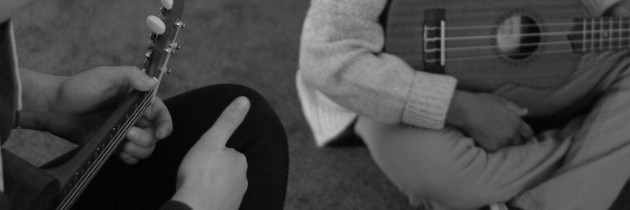David
David began the school year having never played guitar nor any other instrument, and unable to read music. A high school senior, he had enrolled in my beginning guitar class to satisfy a state requirement of five credits in the arts. As David took his chair for the third individual student meeting, he said, “I’m prepared as much as I can be,” which at the time sounded to me like a preamble designed to lower my expectations. In hindsight, I also hear the remark more simply as mentally fortifying himself to take on the challenge presented to him.
David’s performance disappointed me. Several other absolute beginners had been doing far better. In spite of having had enough time, in my opinion, to memorize the eight-measure example, he played as if he knew the notes of the instrument but had never seen the music before. Also, David played very softly, so I told him to forget about rhythms and just play every note strong. We worked to identify the note he knew the least well (open B on the second string) so he could focus on it.
“I think I understand (the system of standard notation) but I’m bad at multitasking,” David offered.
I tried to validate him, “Yeah, I know this asks a lot of you.”
I pointed out to him that he probably finds reading E, F and G on the first string easier than B, C and D on the second string because he has known them longer. He agreed with me, and I went on to explain that this process would continue to happen, he would continue to feel more confident with information that had been practiced longer and absorbed more deeply. I also encouraged him to press down harder on the strings with his fretting hand to get a better sound.
I had surveyed all my students on the first day of class. David had indicated no previous history with musical instruments and no music literacy. For a high school music teacher, this looked like frustration waiting to manifest. David appeared to me a clear example of a disaffected, unmotivated student going through the motions and applying a bare minimum of effort.
However, two weeks later I noted his absence in class over three consecutive days. Each day, David had been marked absent from my class, first period, but not marked absent from school. My electronic attendance taking had not triggered a “cut slip,” but as I was concerned he might be ditching my class, so I contacted his guidance counselor. The counselor apologized for not informing me earlier, but David had been in a supervisor’s office at those times dealing with “a serious issue.”
I learned that David, a high school senior, was the oldest child of four in a single-parent household and was working full-time at a supermarket to help out his mother, who worked at a drug store. David was taking two AP courses and, at the end of the first quarter, was carrying a C in one and a D- in the other, and it was his D- in the one AP course was the “serious issue” the counselor had mentioned. All other grades were A’s and B’s.
Given what I had just learned about the circumstances of David’s daily life, I was very impressed with his work ethic at school and that he could put forth any effort at all into learning guitar. The combination of his transcript and his present life circumstances would make a very compelling narrative for a college recommendation letter and tell the story of a hard working student doing his best under extraordinarily difficult circumstances. Given everything, the fact that he had learned the basics of standard musical notation and could play some simple melodies on a few notes of the guitar after only six or seven weeks of exposure, suddenly seemed remarkable. This insight gave me all the more reason to act as compassionately as possible in my interactions with David.
At the fourth meeting, that compassionate stance was very much on my mind as David took his seat. He announced which piece he had chosen to play in standard notation, and then proceeded to play it⍈—not perfectly, but with considerably more continuity and confidence than the previous time. I told him I thought he sounded far more musical than he had at our last appointment, and he agreed. I worked with him a little on steadying his tempo and his playing responded well.
My thinking about David had changed. I had to admit that if I were in his shoes, working full time and carrying his academic load, I would not have very much extra focus, concentration, or motivation to spend on a class asking me to learn and practice unfamiliar things on a regular basis. I realized that all this time, David had actually been putting in sincere effort and perhaps wasn’t retaining quite as much one day to the next simply due to a lack of sleep and having a lot on his mind.
At David’s fourth and final meeting, his tempo was still not even, but he made very definite improvement in that I could hear his standard notation portion as actual musical phrases, instead of notes laboriously delivered one after another. I heartily congratulated David on what I considered a big leap forward. His chords had improved somewhat as well but there was still work to do.
I asked him if there were any songs he had in steady rotation on his phone, and he mentioned “I Know What You Did Last Summer” by Shawn Mendes and Camila Cabelo. I told him I’d find him the chord progression for that song and later emailed him with the chords to the main portion and a link to a good chart with chords and lyrics. My hope was to find something for him to personally connect with in my class. I could not lighten his load at all, but if I could give David some way to play a song he cared about, perhaps that song could grow into a larger place of refuge in the future. If David could find some kind of enjoyment or satisfaction in playing an instrument, that means more to me than any vaguely worded set of performing arts standards.
Four months later, David was in my classroom during his lunch period, making up for some class time he had missed, ensuring that he could earn course credit. He told me he was thinking about buying an acoustic guitar but had a limited budget and asked if I had any suggestions on buying a guitar.
Andrew Pfaff


